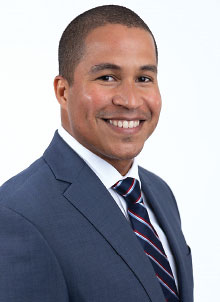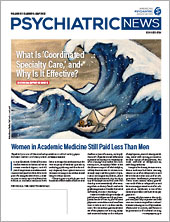Extended availability of enhanced Medicaid funding has long been undependable for U.S. territories. But a number of natural disasters over the past several years, in addition to the COVID-19 pandemic, have highlighted the urgency of ensuring that the territories have steady access to funds to help residents access care.
There are systemic inequalities in the way Medicaid funding is handled for U.S. territories compared with states, said Alan Rodríguez Penney, M.D., a psychiatrist in New York City and a board member of CrearConSalud, a nonprofit organization in Puerto Rico with a goal of supporting and educating the community around mental health needs ("
Psychiatrists Collaborate With Puerto Rican Communities After Storm"). For states, there is no cap on federal Medicaid dollars, and the federal matching rate is adjusted annually based on the state’s per capita income. The greater the state’s poverty rate, the more Medicaid funding the federal government provides. Territories, however, not only have capped federal allotments, but also their matching rate is fixed in statute. If the territory reaches its capped allotment, it no longer receives federal funds for Medicaid during that fiscal year.
To supplement inadequate federal funding, Rodríguez Penney explained, Puerto Rico relies on federal block grants, which provide a fixed amount of money for a stipulated number of years. “That strategy has several limitations, though, like not being able to build long-term, continuously effective programs because there’s no guarantee the money will still be there in two years,” Rodríguez Penney said.
Periodically, Congress increases the allotment or federal match for territories, as it did for fiscal years 2020 and 2021 through the Further Consolidated Appropriations Act of 2020 and the Families First Coronavirus Response Act. But those funding bumps are accompanied by expiration dates that still put limits on the territories’ ability to plan long term, Rodríguez Penney said. In the recently passed Consolidated Appropriations Act of 2022, Congress pushed the expiration date for enhanced Medicaid funding back to December (see "
Congress Passes Spending Bill, Extends Telehealth Flexibilities").
There is a huge amount of need in Puerto Rico, added Dimas Tirado-Morales, M.D., M.P.H., president of CrearConSalud. Between the pandemic and natural disasters such as Hurricane Maria and numerous earthquakes, huge numbers of people are without homes or the technology necessary for virtual video telepsychiatry, Tirado-Morales said. “Most of my appointments have been over the phone because people cannot log in to video or they can’t get to the clinic,” said Tirado-Morales, who returned to Puerto Rico in 2020 after 10 years of practicing psychiatry in Philadelphia.
The territories’ federal match rate is set in statute at 55%. By comparison, the match rate for Mississippi, the country’s poorest state, was set at 76% in 2019, according to the Center for a New Economy, a Puerto Rican think tank. There is more than twice as much poverty in Puerto Rico than in Mississippi. “In Puerto Rico, we have a little over 3 million people on the island, and almost half are reliant on Medicaid services,” Rodríguez Penney said.
Rodríguez Penney and Tirado-Morales argue that the Medicaid funding structure for the territories should be similar to that of the states, with a higher fixed rate that provides greater, permanent coverage for residents. Inadequate funding means the territories are significantly limited in who qualifies for Medicaid and what services are covered. In Puerto Rico, eligibility is restricted to 43% of the federal poverty level, equal to $11,316 for a family of four.
APA has long supported not only temporarily extending enhanced Medicaid funding for territories, but also permanently increasing federal allotments and matching rates. The Build Back Better Act, which APA supports, would permanently enhance Medicaid funding, modestly for some territories and significantly for others. Puerto Rico, for example, would see its allotment increase by 20%, while its federal matching rate could rise from 55% to 83% if it established a reimbursement floor for provider payments, according to the Kaiser Family Foundation (“
Medicaid Financing and the U.S. Territories: Implications of The Build Back Better Act“).
The Build Back Better Act passed the House but has been stalled in the Senate, but there are additional bills in Congress that would expand Medicaid funding for the territories. Notably, the bipartisan Supporting Medicaid in the U.S. Territories Act of 2021 (HR 4406) advanced out of the House Energy and Commerce Committee last July. The bill would extend enhanced funding for five years for Puerto Rico, with a 76% federal matching rate and eight years for other territories with an 83% matching rate. The House has not yet voted on the bill, however.
The efforts to avoid a fiscal cliff for the U.S. territories are not limited to legislation, however. In September 2021, the Centers for Medicare and Medicaid Services based the fiscal year 2022 allotment rate for Puerto Rico on the 2020 rate, which was higher due to increases included in a COVID-19 relief bill. A
Government Accountability Office (GAO) report last November found that the Centers for Medicare and Medicaid Services did not have the authority to adjust the base allotment that is set in statute, however. But the GAO’s opinion is nonbinding, and it is unclear whether health officials will take the opinion into account.
“I understand that the issue is that Puerto Rico is not a state; we are a colony,” Tirado-Morales said. “Yet we participate in the U.S. military, and we have paid with blood and sweat for many decades. We have the right to ask for health care equality.” ■


